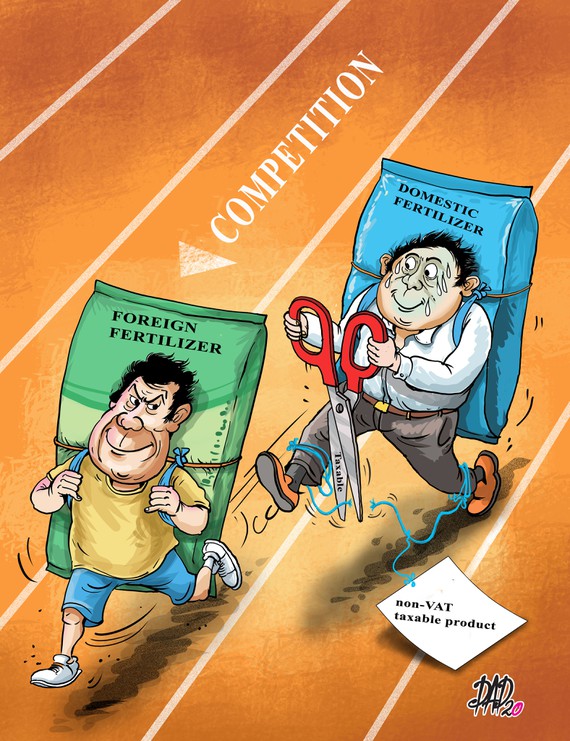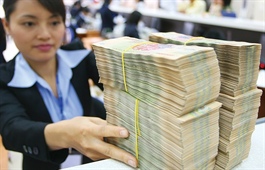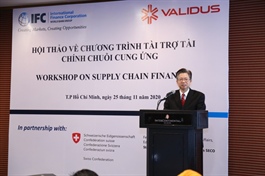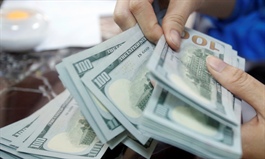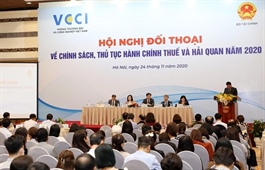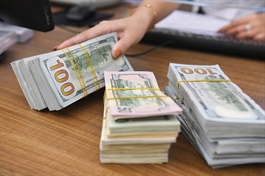Tax deduction not wholly beneficial for fertilizer industry
Tax deduction not wholly beneficial for fertilizer industry
The Ministry of Finance has submitted a draft amendment to the Government on relaxation of tax for the fertilizer industry, which will eventually help domestic enterprises to increase competitiveness with imported fertilizers. However, this new tax amendment may not be beneficial to all fertilizer businesses in Vietnam.
Illustrative photo.
|
Not all businesses benefit
According to the Law on Value Added Tax (VAT) No. 13/2008, fertilizer as a product is subject to 5% tax. However, the Government has adjusted fertilizer as a non-VAT taxable product, applicable both to domestically produced fertilizers as well as imported fertilizers. This supports farmers and reduces fertilizer prices. Consequently, fertilizer companies are not allowed to deduct and refund VAT on input goods and services used for fertilizer production but must include all expenses in their production costs. Therefore, many farmers have had to switch to low priced imported fertilizers to reduce expenses. This reduces the competitiveness of domestic fertilizers.
In the last few years, the nitrogen fertilizer industry has faced many difficulties, resulting in serious losses with some companies even going on verge of bankruptcy. Based on this fact, the Ministry of Finance recently submitted to the Government a draft amendment to the tax law, in which fertilizers will not be subject to a 5% VAT tax. With this policy, the selling price of imported fertilizer will be less attractive than before, due to the additional VAT tax. Fertilizer manufacturing companies are allowed to deduct all input VAT on input machinery, raw materials, fuel, and services used in production. The decrease in cost of goods sold (COGS) will create conditions for businesses to reduce selling price, and increase competitiveness with imported fertilizers.
Fertilizer companies reported a sudden increase in profits in the first nine months of the year, mainly due to a sharp drop in input price of coal and natural gas. This is an opportunity for fertilizer companies to reduce product costs and increase profit margins because the selling price of products often decreases from decrease in input prices.
Varied impact
According to securities companies, the impact on each enterprise will not be the same because of the difference in products and business types. For instance, urea producers such as DPM, DCM, and Ha Bac Nitrogenous Fertilizer and Chemicals Joint Stock Company (DHB) benefit the most since their inputs are natural gas or coal, which are subject to a 10% tax. The next group of beneficiaries are companies producing single phosphate fertilizer such as the Van Dien Fused Magnesium Phosphate Fertilizer Joint Stock Company (VAF), the Ninh Binh Phosphate Fertilizer Joint Stock Company (NFC), and the DAP Joint Stock Company (DDV), because these companies mainly use apatite ore which is subject to 5% tax, and coal which is subject to 10% tax.
Companies producing NPK fertilizer such as the Binh Dien Fertilizer Joint Stock Company (BFC), SFG, and some other commercial enterprises, do not benefit, because the input is finished fertilizer, which is not subject to VAT. When the new policy comes into effect, the tax on both input and output will be 5%. Lam Thao Chemical and Lam Thao Fertilizers & Chemicals Joint Stock Company (LAS) are exceptions because of their ability to produce phosphate fertilizers as input material for NPK production, therefore, LAS is forecast to benefit from new regulations similar to phosphate companies.
Even the decrease in input material prices will only bring advantage for some businesses, such as DCM and DPM. These two enterprises of the Vietnam Oil and Gas Group (PVN) produce urea by gas, with has an input proportion of about 20%. Phosphate and NPK producers such as LAS, BFC, and SFG are indirectly benefiting from buying raw materials from the above companies. On the other hand, the remaining fertilizer producers do not benefit or even have an adverse impact from the price reduction, resulting in lower profit margins.
Poor growth in long term
When the new tax policy is approved, fertilizer companies will only benefit in the short term. In the long term, the fertilizer industry is still a low potential industry because of certain factors such as decrease in cultivated area, weather fluctuation, and demand fluctuation. According to the General Statistics Office, the total cultivated area in Vietnam has been stable since 2000 at 11 million hectares, focusing on key crop varieties such as rice, rubber, cashew, pepper, and fruits.
Demand for the consumption of fertilizer products has reached 11 million tons per year, of which NPK consumed the most with a total of 3.8 million tons per year, while urea demand was stable at 2 to 2.2 million tons per year. However, currently the main agricultural crops are reducing in terms of cultivated area. The reason is the inevitable consequence of urbanization and industrialization, with farmers leave the profession of farming to move to other more lucrative occupations.
Oversupply eroded the profit margin of domestic manufacturing enterprises, such as for NPK where domestic demand is only 4 million tons per year and has not increased in the past four years. For the NPK market, domestic companies meet 92% of the supply and imports add 350,000 tons per year. Therefore, if the overall demand for fertilizer in the country does not increase or increases slowly then oversupply in the nitrogen fertilizer market will be created in the NPK fertilizer market from about 2022 onwards.
Despite recording good business results in the first few months of the year, the stock price level of nitrogenous fertilizer companies is now quite low, due to a sharp decline in recent years. With this fact, the fertilizer industry is recommended only for surfing investors in each cycle, because this is a poor growth industry with high competition, so the industry's profit margin has declined over the years. Investors can buy shares in the industry to enjoy dividends at the bottom of the cycle because this industry is a long-standing industry with a large accumulation of money.


